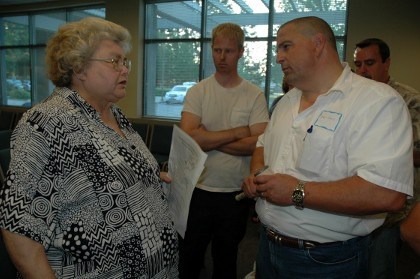MARYSVILLE – “I didn’t realize I was raising such a stink,” Marysville resident Mike Davis joked at the introductory meeting for his group, Citizens for a Smell-Free Marysville, as close to 60 area residents crowded into one of the conference rooms of the Marysville Library July 19.
The group’s mission is to work with the Puget Sound Clean Air Agency to enforce permit requirements on air quality, in part by compelling Cedar Grove Composting on Smith Island in Everett to make whatever improvements are needed to eliminate the odor that many area residents have reported coming from the facility.
Paul Roberts, Board chair of the Puget Sound Clean Air Agency and president of the Everett City Council, attended the meeting with Mario Pedroza, supervising inspector for the Puget Sound Clean Air Agency, and several attendees became impassioned as they discussed air quality issues with the two members of the agency.
With Roberts and Pedroza present, Davis explained that his group’s strategy would be to pressure the agency to pressure Cedar Grove to address the smell problem, especially since approximately 1,700 restaurants in Seattle recently signed up with the composting company to process an additional 6,000 more tons of leftover food at the Everett plant. Davis noted that a successful lawsuit was launched against Cedar Grove’s Maple Valley plant in the late 1990s only after area residents began calling in approximately 3,200 odor complaints a year.
Davis also solicited volunteers to collect a goal of 3,000 signatures for a petition objecting to any further expansion of Cedar Grove’s Everett plant until its facility is fully enclosed and equipped with bio-filtration. He pledged to submit these signatures to the mayor and City Council of Everett, the King County executive and Board of Directors, and several members of the Puget Sound Clean Air Agency, including Pedroza.
Sharon Schimke lives four blocks away from Cedar Grove’s Maple Valley plant, and attended Davis’ meeting to inform the crowd that, in spite of receiving a $43,000 settlement from Cedar Grove, their Maple Valley plant has continued to produce odors so foul that children at the school building just a few blocks from her house are called indoors during recess to keep them from vomiting.
“That settlement did not cover the smell,” Schimke said. “All I wanted was no smell. I’ve been getting up every day at 2 a.m. to call the Puget Sound Clean Air Agency and report that smell.”
While there was some debate as to whether phone calls or e-mails would be better to send to the agency, Schimke reminded those who would lodge complaints to include their names, addresses with ZIP codes, phone numbers, the times of day and “what the odor smells like.” The Puget Sound Clean Air Agency’s hours of operation are 8 a.m. to 4:30 p.m. Mondays through Fridays, with voicemail recording complaints logged after hours.
When Roberts and Mendoza spoke to the crowd, Davis emphasized that the two had agreed to attend the meeting without having to be asked. At the same time, Davis echoed the crowd’s complaints about the working hours of the agency’s inspectors to Roberts. The Puget Sound Clean Air Agency must send an inspector to the address of a complaint call and immediately trace the reporter odor to its source in order to cite a company for odor violations, which led a number of attendees to accuse the agency of conspiring with Cedar Grove to refrain from implementing a swing shift for inspectors to benefit Cedar Grove.
“I disagree that we have a ‘cozy relationship’ with Cedar Grove, and I certainly don’t think they see it that way,” Roberts said. “You raise a fair question, though.”
“Can you pledge to at least look into the schedules for your inspectors?” Davis asked Roberts. “Because where I live, you can practically set your clock to when that smell starts.”
Although Roberts agreed to do so, the crowd voiced further frustrations with the fact that Roberts had already been discussing this issue with the Board for the past two years, as well as what they saw as the ineffectiveness of the agency’s fines against a company like Cedar Grove, to which Roberts responded by asserting that the Puget Sound Clean Air Agency does not set policy, but merely enforces it.
Roberts also proposed some measures that proved popular with the crowd, such as a joint jurisdictional review between the city of Everett and the Puget Sound Clean Air Agency for future permits, and when he described Cedar Grove as “an unregulated utility that probably needs to be regulated,” he received applause.
When one attendee suggested boycotting the Seattle restaurants that send their waste to Cedar Grove’s Everett plant, Davis make clear that he hasn’t ruled out any options.
“I’ll do pickets,” Davis said. “I’ve talked with IGA and Safeway on State Avenue and Haggen’s. We need to get creative. This is a grass-roots effort. I’ve been putting in the money for this myself so far. I’m willing to fight like hell for this because I haven’t gotten to sleep before 1 a.m. in the last two months.”
The Citizens for a Smell-Free Marysville website is http://freemarysville.blogspot.com, and the The Puget Sound Clean Air Agency complaint website is www.pscleanair.org/contact/complaint.aspx.
To report an odor by phone, call the agency at either 206-343-8800, ext. 6, or 800-552-3565, ext. 6. You can also report it via e-mail at inspection@pscleanair.org.



